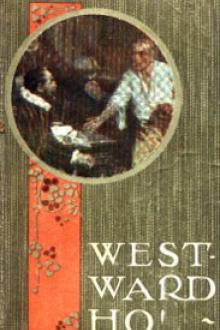Westward Ho! Or, The Voyages and Adventures of Sir Amyas Leigh, Knight, of Burrough, in the County of Devon, in the Reign of Her Most Glorious Majesty Queen Elizabeth by - (acx book reading .TXT) 📖

- Author: -
Book online «Westward Ho! Or, The Voyages and Adventures of Sir Amyas Leigh, Knight, of Burrough, in the County of Devon, in the Reign of Her Most Glorious Majesty Queen Elizabeth by - (acx book reading .TXT) 📖». Author -
Soon his fit of frenzy passed off, and he sank back exhausted.
They lifted him into their remaining boat, rowed him ashore, carried him painfully up the hill to the old castle, and made a bed for him on the floor, in the very room in which Don Guzman and Rose Salterne had plighted their troth to each other, five wild years before.
Three miserable days were passed within that lonely tower. Amyas, utterly unnerved by the horror of his misfortune, and by the over-excitement of the last few weeks, was incessantly delirious; while Cary, and Brimblecombe, and the men nursed him by turns, as sailors and wives only can nurse; and listened with awe to his piteous self-reproaches and entreaties to Heaven to remove that woe, which, as he shrieked again and again, was a just judgment on him for his wilfulness and ferocity. The surgeon talked, of course, learnedly about melancholic humors, and his liver's being “adust by the over-pungency of the animal spirits,” and then fell back on the universal panacea of blood-letting, which he effected with fear and trembling during a short interval of prostration; encouraged by which he attempted to administer a large bolus of aloes, was knocked down for his pains, and then thought it better to leave Nature to her own work. In the meanwhile, Cary had sent off one of the island skiffs to Clovelly, with letters to his father, and to Mrs. Leigh, entreating the latter to come off to the island: but the heavy westerly winds made that as impossible as it was to move Amyas on board, and the men had to do their best, and did it well enough.
On the fourth day his raving ceased: but he was still too weak to be moved. Toward noon, however, he called for food, ate a little, and seemed revived.
“Will,” he said, after awhile, “this room is as stifling as it is dark. I feel as if I should be a sound man once more if I could but get one snuff of the sea-breeze.”
The surgeon shook his head at the notion of moving him: but Amyas was peremptory.
“I am captain still, Tom Surgeon, and will sail for the Indies, if I choose. Will Cary, Jack Brimblecombe, will you obey a blind general?”
“What you will in reason,” said they both at once.
“Then lead me out, my masters, and over the down to the south end. To the point at the south end I must go; there is no other place will suit.”
And he rose firmly to his feet, and held out his hands for theirs.
“Let him have his humor,” whispered Cary. “It may be the working off of his madness.”
“This sudden strength is a note of fresh fever, Mr. Lieutenant,” said the surgeon, “and the rules of the art prescribe rather a fresh blood-letting.”
Amyas overheard the last word, and broke out:
“Thou pig-sticking Philistine, wilt thou make sport with blind Samson? Come near me to let blood from my arm, and see if I do not let blood from thy coxcomb. Catch him, Will, and bring him me here!”
The surgeon vanished as the blind giant made a step forward; and they set forth, Amyas walking slowly, but firmly, between his two friends.
“Whither?” asked Cary.
“To the south end. The crag above the Devil's-limekiln. No other place will suit.”
Jack gave a murmur, and half-stopped, as a frightful suspicion crossed him.
“That is a dangerous place!”
“What of that?” said Amyas, who caught his meaning in his tone. “Dost think I am going to leap over cliff? I have not heart enough for that. On, lads, and set me safe among the rocks.”
So slowly, and painfully, they went on, while Amyas murmured to himself:
“No, no other place will suit; I can see all thence.”
So on they went to the point, where the cyclopean wall of granite cliff which forms the western side of Lundy, ends sheer in a precipice of some three hundred feet, topped by a pile of snow-white rock, bespangled with golden lichens. As they approached, a raven, who sat upon the topmost stone, black against the bright blue sky, flapped lazily away, and sank down the abysses of the cliff, as if he scented the corpses underneath the surge. Below them from the Gull-rock rose a thousand birds, and filled the air with sound; the choughs cackled, the hacklets wailed, the great blackbacks laughed querulous defiance at the intruders, and a single falcon, with an angry bark, dashed out from beneath their feet, and hung poised high aloft, watching the sea-fowl which swung slowly round and round below.
It was a glorious sight upon a glorious day. To the northward the glens rushed down toward the cliff, crowned with gray crags, and carpeted with purple heather and green fern; and from their feet stretched away to the westward the sapphire rollers of the vast Atlantic, crowned with a thousand crests of flying foam. On their left hand, some ten miles to the south, stood out against the sky the purple wall of Hartland cliffs, sinking lower and lower as they trended away to the southward along the lonely ironbound shores of Cornwall, until they faded, dim and blue, into the blue horizon forty miles away.
The sky was flecked with clouds, which rushed toward them fast upon the roaring south-west wind; and the warm ocean-breeze swept up the cliffs, and whistled through the heather-bells, and howled in cranny and in crag,
“Till the pillars and clefts of the granite Rang like a God-swept lyre;”while Amyas, a proud smile upon his lips, stood breasting that genial stream of airy wine with swelling nostrils and fast-heaving chest, and seemed to drink in life from every gust. All three were silent for awhile; and Jack and Cary, gazing downward with delight upon the glory and the grandeur of the sight, forgot for awhile that their companion saw it not. Yet when they started sadly, and looked into his face, did he not see it? So wide and eager were his eyes, so bright and calm his face, that they fancied for an instant that he was once more even as they.
A deep sigh undeceived them. “I know it is all here—the dear old sea, where I would live and die. And my eyes feel for it; feel for it—and cannot find it; never, never will find it again forever! God's will be done!”
“Do you say that?” asked Brimblecombe, eagerly.
“Why should I not? Why have I been raving in hell-fire for I know not how many days, but to find out that, John Brimblecombe, thou better man than I?”
“Not that last: but Amen! Amen! and the Lord has indeed had mercy upon thee!” said Jack, through his honest tears.
 Have you ever thought about what fiction is? Probably, such a question may seem surprising: and so everything is clear. Every person throughout his life has to repeatedly create the works he needs for specific purposes - statements, autobiographies, dictations - using not gypsum or clay, not musical notes, not paints, but just a word. At the same time, almost every person will be very surprised if he is told that he thereby created a work of fiction, which is very different from visual art, music and sculpture making. However, everyone understands that a student's essay or dictation is fundamentally different from novels, short stories, news that are created by professional writers. In the works of professionals there is the most important difference - excogitation. But, oddly enough, in a school literature course, you don’t realize the full power of fiction. So using our website in your free time discover fiction for yourself.
Have you ever thought about what fiction is? Probably, such a question may seem surprising: and so everything is clear. Every person throughout his life has to repeatedly create the works he needs for specific purposes - statements, autobiographies, dictations - using not gypsum or clay, not musical notes, not paints, but just a word. At the same time, almost every person will be very surprised if he is told that he thereby created a work of fiction, which is very different from visual art, music and sculpture making. However, everyone understands that a student's essay or dictation is fundamentally different from novels, short stories, news that are created by professional writers. In the works of professionals there is the most important difference - excogitation. But, oddly enough, in a school literature course, you don’t realize the full power of fiction. So using our website in your free time discover fiction for yourself. 




Comments (0)